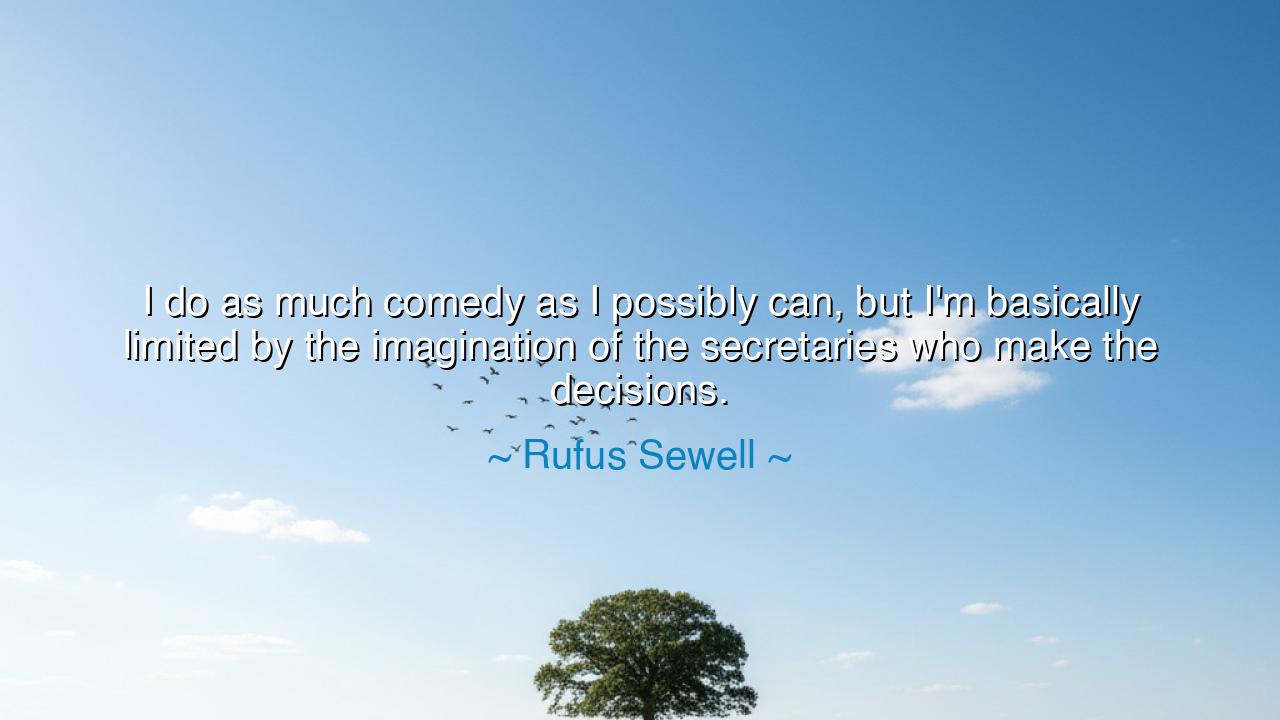
I do as much comedy as I possibly can, but I'm basically limited
I do as much comedy as I possibly can, but I'm basically limited by the imagination of the secretaries who make the decisions.






“I do as much comedy as I possibly can, but I'm basically limited by the imagination of the secretaries who make the decisions,” said Rufus Sewell, the British actor whose career has been marked by depth, restraint, and a fierce devotion to his craft. Beneath the wry humor of this statement lies a truth both tragic and timeless: that even the most gifted soul may find his path constrained by the imagination of others. Sewell’s lament is not only about acting or art — it speaks to all who labor under the blindness of bureaucracy, to all who have felt their creativity stifled by those who cannot see beyond the boundaries of convention.
In the world of performance, as in life itself, it is often not talent that determines destiny, but perception — and perception is ruled by imagination. The “secretaries” Sewell refers to are not literal alone, but symbolic of a greater truth: that society, with all its structures and hierarchies, often entrusts the power of decision not to the dreamers, but to the gatekeepers. They are the guardians of the familiar, fearful of risk, unwilling to imagine what could be. And thus, the artist — whose lifeblood is vision — finds himself caged not by failure, but by the smallness of others’ dreams.
This tension between creator and controller is as old as civilization. The poet Ovid, exiled from Rome by Augustus, knew it well. His verses — daring, sensual, and alive with wit — offended the emperor’s sense of propriety. Though Ovid had reshaped language itself, his fate was sealed by those whose imagination could not bear the freedom of his art. He was cast to the edges of empire, and there he wrote of the sorrow of a caged spirit. Yet his words endured, outliving the power that silenced him. So too, Sewell’s lament carries the same defiance: that while authority may confine opportunity, it cannot extinguish the imagination of the creator.
It is a cruel irony that those with the narrowest vision often hold the broadest power. The artist, the innovator, the thinker must therefore walk a difficult path — one of persistence amid dismissal, of faith amid rejection. Sewell’s words are not bitter, but clear-eyed. He recognizes that creativity flourishes not in permission, but in resistance. When the gates of opportunity are closed, the true artist does not surrender; he builds new gates. When he is told he can play only one role, he invents another in his mind — and by doing so, he preserves his inner freedom, even when outer freedom is denied.
Consider Vincent van Gogh, whose paintings, now worth more than kingdoms, were once rejected by every gallery he approached. The world saw madness where he saw color and light. His vision, too, was limited not by skill, but by the imagination of the gatekeepers who could not comprehend his genius. Yet even in obscurity, he painted. Even in despair, he created. For the true artist measures his worth not by the approval of others, but by the faithfulness of his imagination to itself.
Sewell’s lament also reminds us of a universal struggle beyond art — the struggle of all who dream in a world ruled by mediocrity. The teacher who sees potential ignored by administrators, the scientist whose breakthrough is dismissed by cautious funders, the young soul whose wild idea is laughed at — all share in this experience. The imagination of the few can either ignite progress or choke it. History is the tale of those who refused to be defined by the small-minded and dared to think larger than the world allowed.
Let this, then, be the lesson for all who hear: never let the limits of others’ imagination define your own. The world may not always recognize your light; those in power may misunderstand or dismiss it. But if your vision is true, it will endure — for imagination, once kindled, cannot be extinguished by bureaucracy or blindness. Like Ovid in exile, like Van Gogh in poverty, like Sewell behind the camera, hold fast to your art, your truth, your vision.
For in the end, the gatekeepers fade, but the imaginers endure. It is not the secretaries of the world who shape destiny — it is those who dream despite them. So, create as much as you can. Laugh, build, sing, paint, write — and when the world limits you, let your imagination remind you that no one can imprison the mind that knows how to dream.






AAdministratorAdministrator
Welcome, honored guests. Please leave a comment, we will respond soon